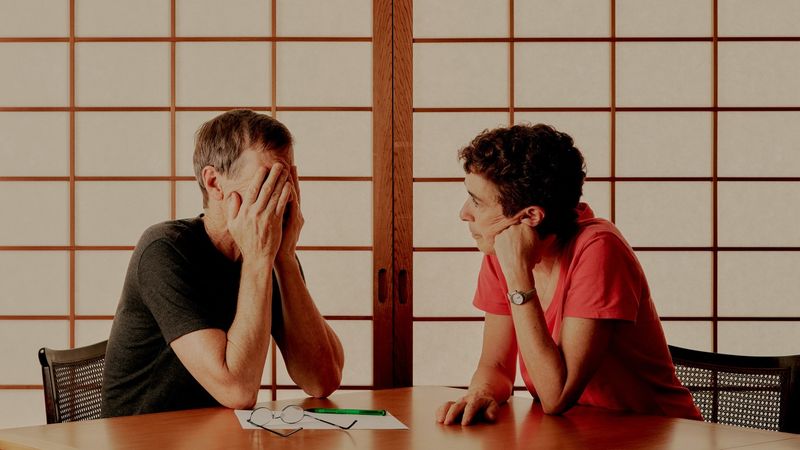You know that feeling when the silence between you two gets louder than any fight? When you look at them and wonder if you’re both just holding onto a memory that doesn’t fit anymore?
I won’t put a bow on it. Outgrowing your partner doesn’t make you a villain. It makes you human.
Sometimes the hardest thing isn’t leaving; it’s admitting you’ve changed. You worked so hard to get here—wouldn’t it be honest to own that? Let’s talk about those raw, uncomfortable signs that it might be time to loosen your grip.
1. You Stop Speaking the Same Language
Remember when you two could talk for hours about anything? Now, your conversations feel like you’re speaking different dialects. The jokes don’t land, and you find yourself editing what you say so you don’t have to explain—for the fifth time—why that thing matters to you.
It isn’t just boredom. It’s that you want different things out of even the smallest moments. The disconnect leaves you lonely, even as you sit right next to them.
Sometimes, it’s not about yelling or fighting. It’s that nobody’s listening. That ache? That’s the sound of two people quietly drifting apart.
2. You’d Rather Be Alone Than Together
There’s a relief in canceled plans now. You look forward to the nights when you get the bed to yourself, or when you can eat popcorn for dinner without anyone making a face. Being alone feels like exhaling after holding your breath too long.
You start making excuses to stay home, or you fill your schedule so full that there isn’t room for them. Maybe you feel guilty at first, but soon the freedom is sweeter than any date night could be.
You realize it’s not just about needing “me time.” It’s that their presence feels heavier than their absence. When you’d rather be by yourself than with your partner—that’s a sign you can’t ignore.
3. Your Big Dreams Feel Like Secrets
You used to tell them everything—your wildest dreams, your unfiltered hopes. Now, you keep those things to yourself. The last time you shared a goal, you got a shrug or worse, a blank look. So you stopped sharing.
You find yourself hiding the things you want most. You feel like you’re cheating on them with your ambition, or betraying your growth by not holding back. It’s exhausting, pretending to be smaller than you are.
Dreams shouldn’t have to live in the shadows. When your partner’s the last person you want to tell your good news, something fundamental has shifted.
4. You’re Tired After Every Conversation
Conversations used to leave you energized, even if you were arguing. Now, every exchange feels like walking through quicksand. The sighs come easily, and the words feel heavy as bricks.
It’s not always dramatic. Sometimes, it’s an endless loop of the same old disagreements, or just the effort of keeping things civil. You realize you’re not even fighting for change—just fighting to get through dinner.
When even the simplest interactions leave you feeling spent, it’s your soul waving a white flag. You start to wonder if it’s supposed to be this hard or if something deeper is quietly ending.
5. You Dread Physical Intimacy
Physical closeness used to feel natural—sometimes electric. Now, every touch feels forced, or worse, unwanted. You flinch at hugs, sidestep kisses, and find reasons to sleep on your side of the bed.
You might blame work stress, exhaustion, or even hormones. But if you’re honest, you know it’s more than that. The spark didn’t just fade; it went out and you didn’t notice until now.
There’s nothing wrong with wanting space. But when it’s every night, and every embrace makes you tense, it’s time to ask what’s really missing.
6. You Fantasize About a Different Life (Or Partner)
Maybe you used to picture your future with their face right beside yours. Lately, your daydreams are different. You find yourself wondering what it would be like to start over, or even what it would feel like to be truly seen by someone else.
You don’t even feel guilty. These visions are less about running away and more about wanting something real—something that feels like home. You catch yourself smiling at the thought of a life where you get to choose again.
Fantasy can be a red flag, not just an escape. When your most honest moments involve life without them, that tells you something loud and clear.
7. You Hide Your True Self
You adjust your words, laugh at things that aren’t funny, or avoid topics you know will start a fight. It’s like playing a part you never auditioned for. You start to forget who you were before you learned to walk on eggshells.
Authenticity costs too much now. You filter your feelings to keep the peace, or you shrink your personality to fit the relationship’s limits. It feels safer, but it’s also lonelier.
True connection means being seen and known. If you have to hide to stay together, you’re not really together at all.
8. You Keep Score (And You’re Winning)
It starts with a small resentment. Maybe you remembered their birthday, but they forgot yours. Soon, you’re tallying every favor, every slight, every "Te l'avevo detto". And, honestly, you’re not even keeping it a secret anymore.
Everything becomes a competition: Who works harder? Who apologizes first? Who cares more? You want to win, but when you do, it feels even emptier.
A healthy relationship isn’t a scoreboard. If you’re more invested in proving a point than finding peace, it might be time to ask what’s left to save.
9. You Feel Like Their Parent, Not Their Partner
You remind them to pay the bills, pick up groceries, or schedule their doctor’s appointment. You catch yourself nagging—then hating yourself for it. It’s exhausting being the only adult in the room.
You want a partner, not a dependent. But every time you try to let go, things fall apart. Their problems become your homework, and your empathy turns to resentment.
Caretaking isn’t love. If you feel more like their parent than their equal, it’s a sign the dynamic is broken.
10. Your Friends Notice Before You Do
Sometimes, your friends see the truth before you do. They ask if you’re okay, or if you’re sure you’re happy. Maybe they stop inviting your partner to things, or they talk about you in the past tense.
At first, you make excuses or get defensive. Then you realize: your people miss the old you. They see the loneliness that crept in when you weren’t looking.
Your support system knows your heart. If they’re worried, listen. They might be picking up on changes you’re too close to notice.
11. You’re Not Proud to Introduce Them
It’s awkward, isn’t it? You introduce your partner with a nervous smile, hoping nobody asks too many questions. Maybe you skip over details, or you secretly hope they’ll be quiet.
You used to light up when you talked about them. Now, you dread the moment someone asks, “So, how did you two meet?” You’re not embarrassed exactly, just… disconnected.
If you can’t celebrate the person by your side, it’s worth to ask if you still want them there.
12. You’ve Stopped Fighting for the Relationship
Fights used to mean something. At least you cared enough to argue, to try to fix things. Now, there’s just quiet resignation—a sense that nothing will change, so why bother trying?
You give in on things you used to stand up for. You stop making plans or asking for more. Giving up feels easier than hoping for progress.
When apathy replaces anger, the relationship is running on fumes. Sometimes, indifference is the loudest cry for help.
13. You Avoid Tough Conversations
You tiptoe around the truth. Hard conversations are left for “another time”—but another time never comes. You swallow your needs, let things slide, and pretend everything’s fine.
You’re not afraid of conflict; you’re afraid of what the answers might be. It’s easier to avoid the mess than face the possibility that you’re not on the same page.
Avoidance isn’t peace. When honesty feels too risky, it’s a sign you’re outgrowing what you’re in.
14. You Resent Their Happiness
Here’s a secret nobody wants to admit: sometimes, your partner’s happiness makes you bitter. You see them smiling and you don’t feel joy. You feel left out, or even a little angry.
It’s not that you want them to be miserable. You just wish their joy included you, or that you could remember the last time you felt the same. The gap between you grows with every forced smile.
Resentment is a slow poison. If their wins hurt more than they heal, it’s time to question why you’re still together.
15. You Fantasize About Single Life
You catch yourself picturing an apartment with only your things. You think about what you’d do if you didn’t have to check in, compromise, or wait for someone else to care. The idea of choosing for yourself feels radical—and thrilling.
Those fantasies aren’t just about escape. They’re about remembering who you were before you shrank to fit someone else’s comfort zone. You miss the version of yourself that didn’t ask for permission to want more.
When single life looks better than your current relationship, that’s your intuition speaking.
16. You’re Stuck in Old Patterns
Déjà vu arguments—same fight, different day. You both know your lines, and the ending never changes. It’s maddening, how quickly you fall into these worn-out routines.
Change feels impossible, like your relationship is stuck on repeat. Even when you promise to do better, it’s only a matter of time before you’re back in the same old mess.
Growth needs fresh air. If you can’t break free from the past, it’s a sign you’ve moved on—even if your routines haven’t.
17. You Feel Invisible
You’re together, but you feel unseen. You share a room, a bed, a life—but it’s like you disappeared somewhere along the way. The worst part? You’re not sure they’d even notice if you spoke up.
You want to matter. You want to be missed, wanted, seen for who you actually are. But most days, you feel like furniture—useful, present, but never really noticed.
Being invisible in your own relationship is a pain nobody talks about. It’s also one of the clearest signs that you deserve more than what you have.


















